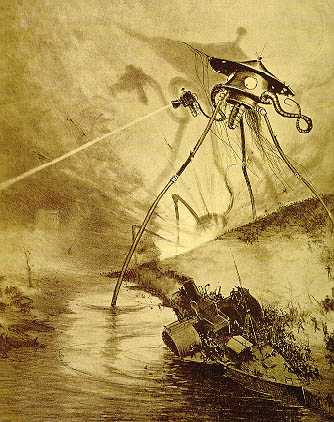 Today, I decided to read the classic H.G Wells short story, War of the Worlds, which is also the basis of a number of movies of the same name.
Today, I decided to read the classic H.G Wells short story, War of the Worlds, which is also the basis of a number of movies of the same name.
The story is so-so – I guess I have become accustomed to alien invasion stories far more interesting, although this story no doubt influenced the majority of them – but this post is not meant as a book review. The point is to draw your attention to a peculiar passage that occurs at one point in the story*, as Londoners are trying to flee their city in the face of the alien assault:
Then my brother’s attention was distracted by a bearded, eagle-faced man lugging a small handbag, which split even as my brother’s eyes rested on it and disgorged a mass of sovereigns that seemed to break up into separate coins as it struck the ground. They rolled hither and thither among the struggling feet of men and horses. The Jew stopped and looked stupidly at the heap, and the shaft of a cab struck his shoulder and sent him reeling. He gave a shriek and dodged back, and a cartwheel shaved him narrowly.
“Way!” cried the men all about him. “Make way!”
So soon as the cab had passed, he flung himself, with both hands open, upon the heap of coins, and began thrusting handfuls in his pocket. A horse rose close upon him, and in another moment, half rising, he had been borne down under the horse’s hoofs.
“Stop!” screamed my brother, and pushing a woman out of his way, tried to clutch the bit of the horse.
Before he could get to it, he heard a scream under the wheels, and saw through the dust the rim passing over the poor wretch’s back. The driver of the cart slashed his whip at my brother, who ran round behind the cart. The multitudinous shouting confused his ears. The man was writhing in the dust among his scattered money, unable to rise, for the wheel had broken his back, and his lower limbs lay limp and dead. My brother stood up and yelled at the next driver, and a man on a black horse came to his assistance.
“Get him out of the road,” said he; and, clutching the man’s collar with his free hand, my brother lugged him sideways. But he still clutched after his money, and regarded my brother fiercely, hammering at his arm with a handful of gold. “Go on! Go on!” shouted angry voices behind.
In other words, H G Wells managed to insert in the middle of this alien invasion story some rather antisemitic imagery: the hook-nosed, money-loving Jew!
I must admit I was not expecting this, since I had never heard of H G Wells being antisemitic. But after some post-Sabbath googling, I found the following:
Wells had given some moderate, unenthusiastic support for Territorialism before the First World War, but later became a bitter opponent of the Zionist movement in general. He saw Zionism as an exclusive and separatist movement which challenged the collective solidarity he advocated in his vision of a world state. No supporter of Jewish identity in general, Wells had in his utopian writings predicted the ultimate assimilation of the Jewish people. In notes to accompany his biographical novel A Man of Parts David Lodge describes how Wells came to regret his attitudes to the Jews as he became more aware of the extent of the Nazi atrocities. This included a letter of apology written to Chaim Weizmann for earlier statements he had made.
This blog post even claims he became an actual supporter of Israel.
Today, H.G. Wells (1866-1946) is primarily known for hisscience fiction novels Invisible Man and War of the Worlds. For the majority of his career, however, Wells regarded himself as a political and social theorist, writing books like A Modern Utopia and a pre-WWII philosophical treatise, The Shape of Things to Come, which predicted a major conflict in Europe.
In the years before World War I, Wells, who was not Jewish, became interested in Territorialism. This was a proto-Zionistschool of thought that called for a Jewish homeland–though not necessarily one in the historical Land of Israel. Wells was initially interested in the possibility of a Jewish state that was presented to him by a fellow writer, Israel Zangwill, and saw it as a version of his own utopian philosophy. However, Wells soon turned hostile toward Zionism, perceiving in it an implied ethnic superiority. “I can offer you neither help nor advice,” he wrote to Zangwill, on the topic of a Jewish state. “Your people are rich enough, able enough, and potent enough to save themselves.”
After World War II, when the truth about the Holocaust became known, Wells again changed his mind, rescinded his earlier statements, and became a vocal supporter of the State of Israel. In fact, he initiated a correspondence with Chaim Weizmann, who would become the first president of Israel, and gave him pointers about starting a new country–not that Wells had ever done it firsthand, but he’d certainly written a lot about it.
Missing from all the online discussion I have seen on H.G Wells’ antisemitism is the antisemitic passage in War of the Worlds, which could indicate that Wells’ opposition to Israel might not have been solely motivated by “the collective solidarity he advocated in his vision of a world state.”
* At the link provided, the word “Jew” is curiously replaced with the less charged “man”



